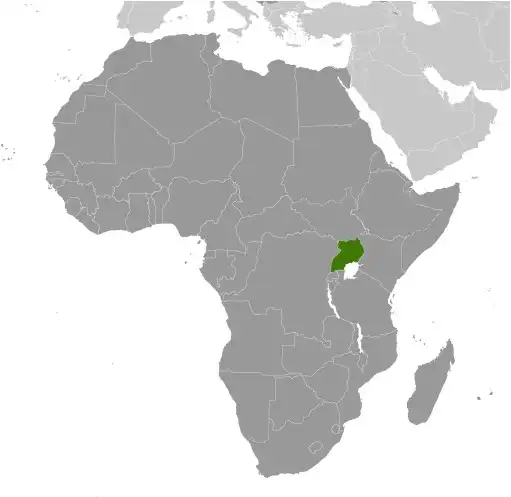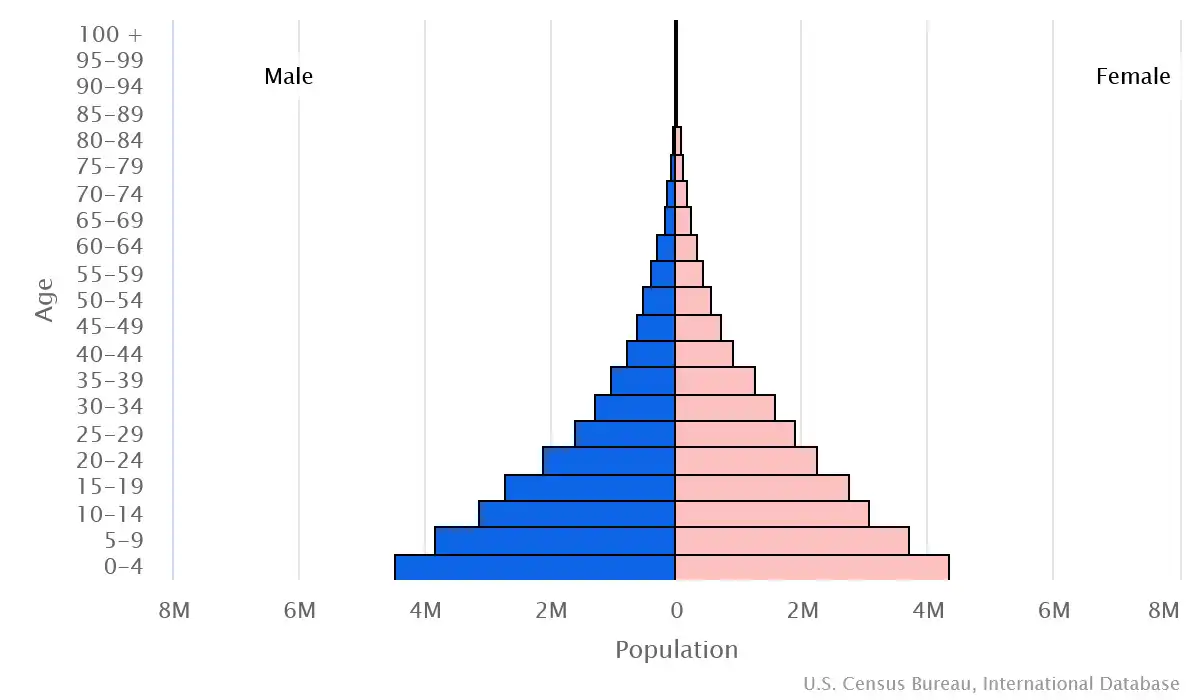
Uganda Country Profile
Key Facts of Uganda

| Government type: | presidential republic |
| Capital: | Kampala |
| Languages: | English (official), Ganda or Luganda (most widely used of the Niger-Congo languages and the language used most often in the capital), other Niger-Congo languages, Nilo-Saharan languages, Swahili (official), Arabic |
Uganda Demographic Data
Ethnic Groups in Uganda(2014 est.)
Religious Groups in Uganda (2014 est.)
Age pyramid of Uganda

Uganda Economy Statistics
Economic overview of Uganda
low-income, primarily agrarian East African economy; COVID-19 hurt economic growth and poverty reduction; lower oil prices threaten prior sector investments; endemic corruption; natural resource rich; high female labor force participation but undervalued
Uganda Real GDP (purchasing power parity) in Billion $
Uganda Real GDP per capita in $
Uganda's Exports & Imports in billion $
Top 5 Import Partnerin 2022 (64%) of Uganda
Top 5 Import Commodities in 2022 of Uganda
- vaccines 💉
- packaged medicine 💊
- plastic products ♻️
- cars 🚗
- motorcycles and cycles 🏍️
Top 5 Export Partnerin 2022 (67%) of Uganda
Top 5 Export Commodities in 2022 of Uganda
- gold 💰
- coffee ☕
- fish 🐟
- milk 🥛
- raw sugar 🍚
Geography of Uganda
Map of Uganda

Land and Water Distrubtion of Uganda
Natural Resources of Uganda
- copper 🟧🪙
- cobalt 🪙
- hydropower 💧⚡
- limestone 🪨
- salt 🧂
- arable land 🌱
- gold 💰
Climate inUganda
tropical; generally rainy with two dry seasons (December to February, June to August); semiarid in northeast
History of Uganda - a Summary
An ancient crossroads for various migrations, Uganda has as many as 65 ethnic groups that speak languages from three of Africa’s four major linguistic families. As early as 1200, fertile soils and regular rainfall in the south fostered the formation of several large, centralized kingdoms, including Buganda, from which the country derives its name. Muslim traders from Egypt reached northern Uganda in the 1820s, and Swahili merchants from the Indian Ocean coast arrived in the south by the 1840s. The area attracted the attention of British explorers seeking the source of the Nile River in the 1860s, and this influence expanded in subsequent decades with the arrival of Christian missionaries and trade agreements; Uganda was declared a British protectorate in 1894. Buganda and other southern kingdoms negotiated agreements with Britain to secure privileges and a level of autonomy that were rare during the colonial period in Africa. Uganda's colonial boundaries grouped together a wide range of ethnic groups with different political systems and cultures, and the disparities between how Britain governed southern and northern areas compounded these differences, complicating efforts to establish a cohesive independent country.
Uganda gained independence in 1962 with one of the more developed economies and one of the strongest education systems in Sub-Saharan Africa, but it descended within a few years into political turmoil and internal conflict that lasted more than two decades. In 1966, Prime Minister Milton OBOTE suspended the constitution and violently deposed President Edward MUTESA, who was also the king of Buganda. Idi AMIN seized power in 1971 through a military coup and led the country into economic ruin and rampant mass atrocities that killed as many as 500,000 civilians. AMIN’s annexation of Tanzanian territory in 1979 provoked Tanzania to invade Uganda, depose AMIN, and install a coalition government. In the aftermath, Uganda continued to experience atrocities, looting, and political instability and had four different heads of state between 1979 and 1980. OBOTE regained the presidency in 1980 through a controversial election that sparked renewed guerrilla warfare, killing as an estimated 300,000 civilians. Gen. Tito OKELLO seized power in a coup in 1985, but his rule was short-lived, with Yoweri MUSEVENI becoming president in 1986 after his insurgency captured the capital. MUSEVENI is widely credited with restoring relative stability and economic growth to Uganda but has resisted calls to leave office. In 2017, parliament removed presidential age limits, making it possible for MUSEVENI to remain in office for life.
